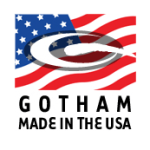
905 Hwy 321 NW Ste. 218 | Hickory, NC 28601
828-327-8099
Located in Hickory, North Carolina, Gotham is an industrial marketing firm providing advertising and marketing for manufacturers nationwide.
Site designed by Industrial Marketing Firm: Gotham
Industrial marketing is a business-to-business (B2B) approach that helps manufacturers and industrial suppliers increase brand awareness, generate qualified leads, improve visibility, and convert technical buyers. It combines digital strategies, such as SEO and content marketing, with traditional methods, like print advertising, to support lengthy, research-driven sales cycles.
Industrial marketing targets engineers, OEMs, and purchasing professionals. It requires in-depth technical content, longer sales cycles, and messaging that emphasizes productivity, precision, and performance, unlike general B2B marketing, which typically focuses on broader messaging and emotional appeal.
Developing a strategic plan that encompasses a company’s strengths and weaknesses, internal marketing review, competitors, market conditions, unique products and services offered, historical sales data, and web analytics should be the priority. This plan should consider the company’s goals for revenue, lead generation, market penetration, and other key objectives. Once these metrics are established, a tactical go-to-market plan is created, including messaging, creative, tactics, and budget. The plan is refined as the results data is collected.
Top tactics include SEO, pay-per-click (PPC) advertising, LinkedIn outreach, email campaigns, trade show marketing, and content marketing, such as videos, white papers, and case studies. For the most significant ROI, it’s wise to create a marketing strategy that evaluates your own company, competitors, and market conditions. This will help establish a messaging strategy, tactics, and budget.
Manufacturers benefit from agencies like Gotham that speak your language regarding technical products, niche markets, and industrial buyers. There is less ramp-up time for learning and a quicker time to market. Additionally, creative campaigns are created that resonate with your target sectors.
Yes. Gotham tailors marketing strategies to specific sectors, such as machinery, plastics, robotics, or logistics, ensuring that messaging aligns with each market’s technical needs and audience. Learn more about the industrial markets we work with here.
Inbound marketing uses helpful content to attract leads (e.g., SEO, blogs), while outbound marketing is primarily used to increase brand awareness and delivers messages through trade ads, web banners, public relations, emails, and trade shows. A combined approach is most effective.
Digital marketing helps manufacturers increase leads by improving organic and paid Google rankings, sharing technical content, and converting visitors through landing pages and gated downloads.
Gotham’s marketing team has been active since 1989 and has over 17 years of experience in generating highly qualified sales leads for manufacturers using digital marketing strategies. Our expertise in search marketing is combined with a deep understanding of the industrial sector to improve ROI.
Content marketing educates buyers with useful resources—such as blogs, spec sheets, and videos—helping them solve problems and progress through the sales funnel. Written content can be search optimized to drive valuable organic traffic.
Yes! SEO ensures your business appears high on leading search engines like Google when engineers or purchasing departments search for parts, solutions, or vendors. It’s essential for maintaining long-term online visibility and generating leads. Industrial SEO targets niche keywords and long-tail phrases that match technical terms, ensuring high-quality traffic and visibility during the research phase of the buying journey. Organic visits resulting from SEO are the most easily converted into customers.
PPC campaigns, such as Google Ads, enable manufacturers to target specific keywords and appear at the top of search results instantly. By focusing on high-intent terms like “CNC machine suppliers” or “industrial automation systems,” PPC helps capture ready-to-buy prospects. Terms that are difficult to rank for with SEO can achieve first page of Google rankings with a well-managed bid strategy.
Social media is a valuable tool for building brand awareness. Platforms like LinkedIn are effective for reaching engineers, distributors, and decision-makers. Sharing articles, company news, and customer success stories creates a brand story and establishes your company as a trusted industry expert. Active social media accounts also communicate that a company is progressive.
Results vary by the uniqueness of the product or service offering, history, target audiences, and marketing channels implemented. The market can’t buy products and services if they’ve never heard of your company. Branding is crucial for establishing a company’s unique identity, and this is a continuous process that requires time to develop and cultivate. Lead generation tactics, such as SEO and Pay-Per-Click marketing, can yield short-term leads. The best results come from intensive strategic planning, consistent branding, and marketing alignment with the sales team.
Key performance indicators (KPIs) include:
Tools like Google Analytics, accounting systems, and CRM platforms help track these metrics.
Most manufacturers invest between 0.5 and 6% of gross revenue in marketing. Budgets typically cover third-party media (trade ads, web banners), design services, and sponsorships. A minimal annual budget would be $60,000 per year, excluding trade show spend.